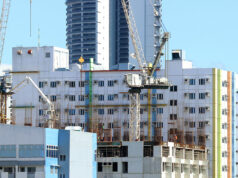PSEi seen ending 2018 at 8,200
By Arra B. Francia
Reporter
THE stock brokerage arm of the Bank of the Philippine Islands (BPI) projects the Philippine Stock Exchange index (PSEi) to close around the 8,200 level by year-end, as investors focus on companies’ fundamentals amid rising inflation and the weakening peso.
Amid the volatility experienced in the first three quarters of the year, BPI Securities Corp. President and Chief Executive Officer Hermenegildo Z. Narvaez said market participants will still look at how companies perform and the outlook for earnings growth.
“The main determining factor is still fundamentals, the corporates’ prospects for earnings growth…and how investors expect them to perform,” Mr. Narvaez told BusinessWorld in an interview at the company’s head office in Makati City last Friday.
“If there’s going to be a rally, it’s gonna be towards the end of this year around December, we should end not far away from 8,200,” he added.
Should this materialize, this would place the PSEi about 4.2% lower than its finish of 8,558.42 in 2017, a reversal of last year’s 25.1% increase from 2016’s close.
‘CHALLENGING’ Q3
By the end of the third quarter, the PSEi has already sunk to 7,276.82, about 15% lower than its 2017 finish. In September alone, the PSEi saw four consecutive weeks of losses.
Mr. Narvaez said the third quarter was a “challenging” time for the PSEi.
“It’s a confluence of all the risks that we were considering could happen, actually manifested in the third quarter. The peso continued to weaken, inflation continued to accelerate. We’re starting to see that impact the earnings of the companies,” he said.
Mr. Narvaez explained that compared to the second quarter where the outflow of funds was driven by the cautiousness against emerging markets, the third quarter put a spotlight on inflation, as well as other short term issues hounding the Philippine market.
The Bangko Sentral ng Pilipinas’ efforts to curb inflation by hiking interest rates — now up by 150 basis points — is also seen affecting companies’ capital-raising efforts.
“When you’re also raising rates, lending rates are going up. So there’s a concern how that will affect consumption, and the investments of companies moving forward and in effect will that affect growth,” Mr. Narvaez said.
With this, some analysts have downgraded their forecasts for some companies in the consumer sector that are directly affected by rising inflation.
“So that includes FMCGs (fast moving consumer goods) like URC (Universal Robina Corp.), restaurants… It’s not just commodity prices, but there’s also some concern about labor cost and how inflation will eventually force companies to likewise raise wages,” Mr. Narvaez explained.
Asked which companies were able to weather the volatility for the quarter, Mr. Narvaez cited San Miguel Corp. and Jollibee Foods Corp. (JFC) due to their aggressive expansion efforts.
He noted, however, that these companies “barely” got through the weak performance as well, as only a few companies actually posted gains.
On the other hand, companies like GT Capital Holdings, Inc. may have faced more headwinds due to the implementation of laws affecting their businesses, such as the Tax Reform for Acceleration and Inclusion law, while regulatory concerns weighed on Metro Pacific Investments Corp.
Moving forward, Mr. Narvaez said the market can correct to around 7,000-7,100. The 7,000 level will indicate a price to earnings ratio of 15x, which he said will be a good entry point for investors.
Mr. Narvaez expects property companies such as Ayala Land, Inc. and SM Prime Holdings, Inc. to deliver strong growth for full-year 2018. He also cited oleochemicals and aerosols manufacturer D&L Industries, Inc., noting its business model can allow it to pass on higher input costs to end-customers — an effective hedge against inflation.



